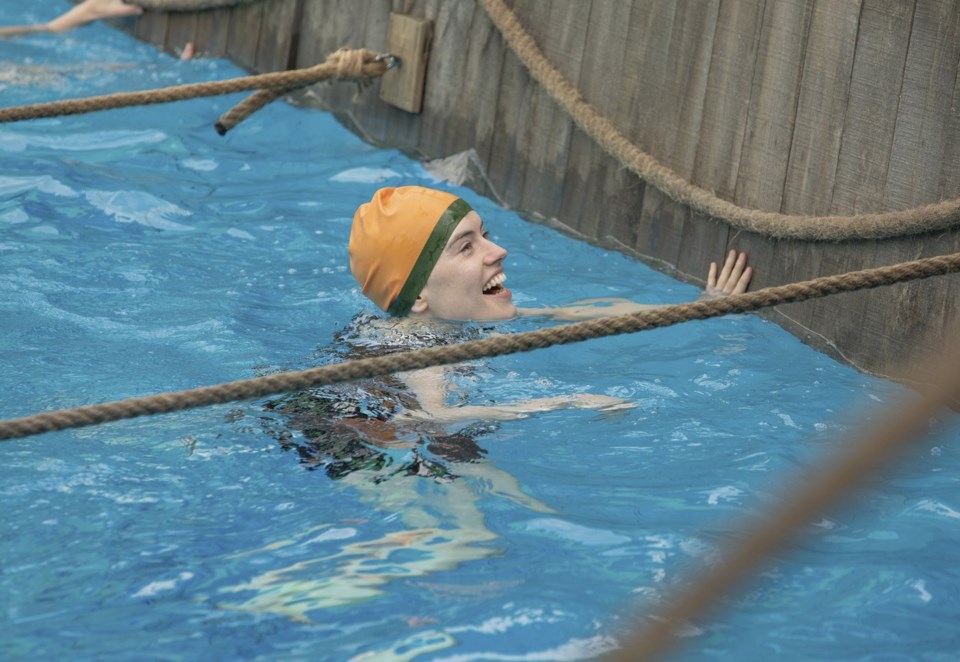In August 1926, a 19-year-old New Yorker named Trudy Ederle became the first woman to swim the English Channel. Only five men had finished the 21-mile trek from Cape Gris-Nez in France to Kingsdown Beach in England before — a harrowing journey through frigid waters, unpredictable tides, currents and swarms of jellyfish. Ederle swam 35 miles that day and still beat their times by about two hours.
Don’t worry if this doesn’t sound familiar. Ederle is not what you might call a household name, but she soon could be thanks to Daisy Ridley, who portrays the competitive swimmer in the inspirational new film “ Young Woman and the Sea.” It is a classically made and effectively stirring sports drama for everyone that feels right on the big screen. Families with young daughters should make this a special priority — this is one of those empowering stories that (mostly) avoids cloying cliches.
Just don’t try to write a school paper off of the movie or regale pals with your newfound knowledge of Ederle at a summer Olympics party. Written by Jeff Nathanson and directed by Joachim Rønning, the movie takes extensive liberties with some significant details surrounding her history-making swim. It even glosses over the fact that she won a gold medal at the 1924 Olympics in Paris in the 400-meter freestyle relay. “Young Woman and the Sea” dwells on the high hopes for Ederle, who had set over a dozen records in women’s swimming, but only won bronze medals by herself.
They weren’t going to let facts get in the way of the truth — or, more accurately, a tidy story with symmetry and emotional payoff. If the whole story is what you’re looking for, the film was adapted from Glenn Stout’s exhaustively researched and widely available book “Young Woman and the Sea: How Trudy Ederle Conquered the English Channel and Inspired the World.” But we don’t go the movies for a history lesson: We go to be entertained.
This story paints Ederle as a survivor, a child of German immigrants who defeated measles and then rose to defy expectations as an exceptional athlete. By 1920, white women were beginning to make headway in sports like tennis and swimming but still beholden to strict standards of “femininity.” Remember those etiquette classes in “A League of Their Own?” In this film, Trudy is assigned a misogynist coach who is more concerned with keeping her separated from the men and on a dainty diet of fruit than actually helping her to succeed with proper nourishment and advice.
Nathanson’s script puts a special emphasis on Trudy’s relationship with her sister Meg (Tilda Cobham-Hervey), also a swimmer, and her mother (Jeanette Hain) who pushes for the girls to learn and helps keep them in lessons with a determined instructor, Lottie Epstein (Sian Clifford).
Epstein’s positive influence on Trudy is spotlighted, but the fact of her management of the women’s swimming teams during three Olympic Games in the 1920s is brushed aside in service of creating a male antagonist. Charitably, it is a shorthand way to illuminate the very real sexism they all faced. It also erases Epstein’s real accomplishments in order to do so. This is a film that’s also very, very white, though they do include one Black swimmer who bonds with Ederle as they both train for the Channel.
But again, the broader history is there for those who are curious and on its own terms this is a story that will keep you engaged. Much of that has to do with Ridley, who aside from Star Wars has not been blessed with the most memorable roles. As an executive producer on “Young Woman and the Sea,” she is perhaps signaling a new phase in her career in which she has more control over things. Trudy Ederle was a great choice, a perfect melding of actor and character that also shows dimensions we didn’t get to see from Rey.
A successful film like this is also a stark reminder that movies have only scratched the surface of the fascinating history of women in competitive sports. It doesn’t seem like a coincidence that more than a few of them have gone on to be classics. But maybe after this and “Nyad,” open water swimming can take a bit of a breather.
“Young Woman and the Sea,” a Walt Disney Pictures release in theaters Friday, is rated PG by the Motion Picture Association for “thematic elements, some language and partial nudity.” Running time: 129 minutes. Three stars out of four.
Lindsey Bahr, The Associated Press



